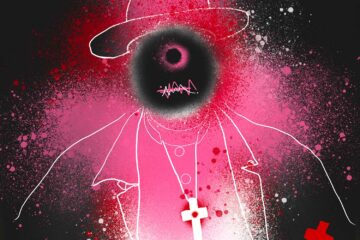Overview: In this solo episode (ep 151), Adam Williams speaks to the misconception non-artists have who walk into galleries and dismiss artists’ work with a flippant, “I could do that” with the help of musician Jack White. He talks about the difference between “I could do that” and “I did that!” (Released on podcast on July 18, 2023)
Also on Apple, Spotify, Pandora, Stitcher, YouTube, Google and other players.
EP 151 SHOW NOTES, LINKS & TRANSCRIPT
Broken Record Podcast, with Rick Rubin, et al
Connect with Adam Williams
Humanitou on Instagram: @humanitou
About Adam
Artwork
Podcast cover art and artwork below: Adam Williams
Music
“Old Rope” by Joe Johnson | joejohnsonsings.com
Original Written Version
Something that’s been in the back of my mind for many years, even long before I was a practicing artist, has been occasionally encountering non-artists looking at art and saying, “I could do that.” It oversimplifies what artists do.
Even before I was actively pursuing my creative potential, I somehow understood that what looks simple and replicable in an artist’s work goes much deeper than that. It’s about the creative process, and ways of thinking and seeing and communicating that give light to such seeming simplicity. As I often say, “(Sophisticated) Simple is not easy.”
Years and years into all the ways I strive for simplicity, in art and otherwise, I feel like I all too often fail to hit the mark. It’s not easy. We tend to overshoot, fail to edit, and overcomplicate.
Art is about ideas, and often about honing. The techniques and materials follow as tools for conveying the ideas.
A while back, I was listening to the Broken Record podcast, hosted by the legendary music producer Rick Rubin. He was talking with musician Jack White.
Here’s a brief exchange between White and Rubin that, all these years later, affirmed what I’ve known but haven’t heard directly said by others until now.
Jack White: “It’s like that kind of thing where people can walk into a museum and say, ‘Well, I can paint that.’ Well, no you couldn’t. You’ve got to come up with that idea, and you’ve got to construct it.”
Rick Rubin: “Yeah. Yeah, yeah yeah. It’s conceptual.”
Jack White: “The actual painting of Jackson Pollock doesn’t really matter, the dripping part, whatever. It’s the same thing with punk rock. It doesn’t really matter about the notes. It’s the attitude behind it. You had to construct that attitude, or coerce it out of you from nothing. And that becomes more important than the proficiency of the music.”

“So Pretty The Flower” by Adam Williams | Humanitou
I suspect that the years prior to my finding the courage to create, even in solitude, was rooted in a misconception about what art is and how it’s made, what validates it and makes it worthy of existing in the world.
I don’t know off-hand when, where or why I broke through to being willing to try. My wife, Becca, who had a better grip on creativity and art making when we met surely was a positive influence for me to step out there and be vulnerable with creative expression.
But knowing myself and my personal history, I also probably just got tired of not heeding the urge. The pain of not creating eventually outweighed the fear of doing it.
I had creative ideas and wants, but I feared the vulnerability of not having the skills to convey them well. That often is the distinction between someone who only says they can do a thing and someone who actually does it: fear, and how you handle it.
Does fear stop you, or do you have courage to walk through it and find out who you are on the other side of it?
I’ve overheard plenty of people standing in galleries diminishing the work of artists when they scoff and say, “I could do that.” They say it as they look at what someone else already conjured, made and dared to put forward for examination.
Where’s the courage in that? Art. Takes. Courage.
And, it’s worth noting, you can make art. All of us can. Maybe you can even make something similar to what you see in a gallery. But you didn’t; that wasn’t you. Why not?
Answering that question for yourself is the beginning of moving from “I could do that” to “I did that.” Go do it.


